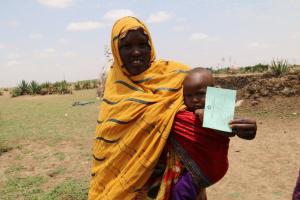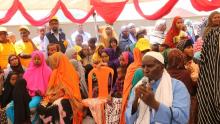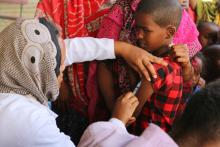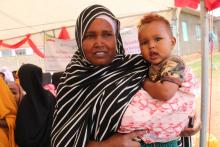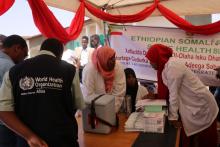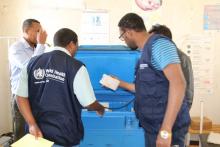Integrated Measles and EOS campaign protects 2.6 million children in Ethiopia’s Somali Region
Measles is a highly infectious vaccine-preventable disease. While children that are not immunized are at risk, those that are also malnourished or are already affected by other diseases are especially susceptible to it. Children in countries and districts where there is an ongoing emergency such as the current drought which has led to water scarcity and food insecurity in the Horn of Africa are therefore more at risk of contracting the virus and developing complications that often lead to disability and even death.
The Ethiopian Federal Ministry of Health launched an integrated measles vaccination and enhanced outreach strategy (EOS) campaign in Somali Region to ensure that all children in the region are protected against measles. The EOS activities included Vitamin A administration, deworming and screening of under-five children, pregnant and lactating women for malnutrition. In light of the above emergency conditions that increase the susceptibility and vulnerability to acute watery diarrhea (AWD), measles outbreak and malnutrition, the target group for the measles campaign in Somali Region of Ethiopia was revised to include a wider age range so that all children who are at risk are protected from measles infection. The revised age group targets children aged 6 months to 14 years (inclusive) instead of the usual target group of 9 months to one year olds.
The integrated measles–EOS campaign in Somali Region of Ethiopia was conducted in two phases June and July/August 2017 covering all 11 zones reaching more than 2.6 million children aged 6 months to 14 years. The first phase covered four priority zones: Jarar, Dollo, Nogob and Korahey. The integrated Measles and EOS campaign will reduce the risk of illness, disability and death of children from measles or malnutrition and will also ensure access to key child survival interventions.
“I see my role as a vaccinator as much more than just a job and I want to make sure that no child is missed. What keeps me committed is the knowledge I had on what my colleagues and I do contributes to ensuring that these precious children will be protected of this vaccine preventable disease and grow up healthy,” said Halima Husien, one of the vaccinators on the campaign.
The campaign had considerable support from community and clan leaders of the Somali Region. Speaking at the launching of the second phase of the campaign, Haji Mohammed Ahmed Omar, a member of the Jigjiga City Islamic Affairs Supreme Council (ISAC) and clan leader, called on the community to get their children vaccinated against measles. “We now have no misconceptions about measles. The only way to protect our children is to get them vaccinated. My guidance to parents and caregivers is to make best use of the opportunity this vaccination campaign presents. If we love our children, then we need to make sure they are protected,” he said.
Parents are now eager to bring their children to the campaign understanding the benefits of the measles vaccines. Previously families have had minimal knowledge about the benefits of prevention of measles from the vaccine. In the past families followed traditional customs to treat measles and as a result some lost their children or their children contracted a life-long disability. The families in the Somali Region know their children are especially vulnerable during the drought and want to take extra steps to protect them.
“Thank you for the government free service in offering this vaccine to our children. I understand the benefit very well and do not want to miss the opportunity. Even I couldn’t tolerate to skip the first day of the campaign though it lasts for seven days.” said Hibo Mohammed, mother of twin children (Huda Khedir and Hani Khedir).
WHO provided technical support during planning at national and regional levels and continued technical and operational support during the campaign implementation at zonal and district levels in the Somali Region. This included pre-campaign training of trainers, overall coordination, social mobilization, supportive supervision and supporting Jijiga University with monitoring during and after the campaign.
Immunization is key to protecting children and communities from measles. There is no specific treatment for measles and most people recover within 2–3 weeks. However, particularly in malnourished children and people with reduced immunity; measles can cause serious complications, including blindness, encephalitis (inflammation of the brain), severe diarrhea, ear infection and pneumonia.
WHO, UNICEF and other immunization partners will continue to support the Federal Ministry of Health and the regional health bureaus to ensure that all children, even those in hard-to-reach areas, have access to immunization, and are protected from seasonal measles outbreaks.
Tel: +251 911 671134
Email: yilmas [at] who.int (yilmas[at]who[dot]int)
Senior Communications Officer
WHO Ethiopia
Email: tesfayel [at] who.int (tesfayel[at]who[dot]int)
Tel: +251 911 144 194 (Direct, Whatsapp)
Measles SIA Coordinator



